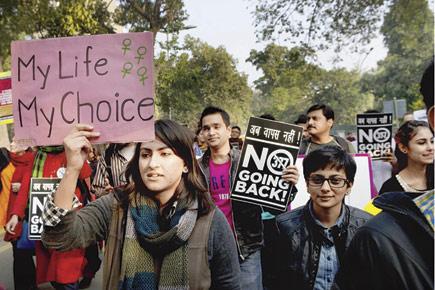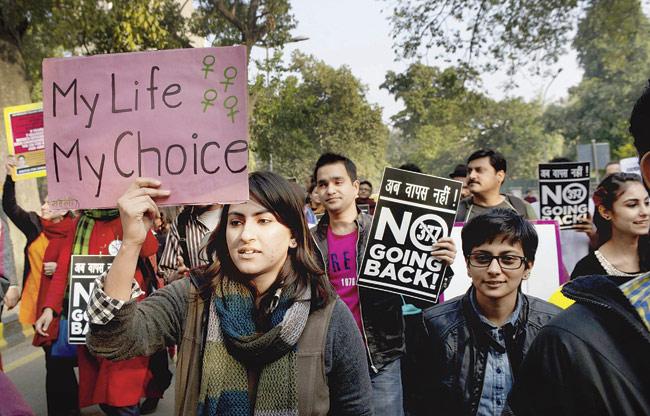India’s Supreme Court has pulled a dark shroud over the country as it turned the clock backwards on human rights and dignity by endorsing the relevance of a 19th century colonial law to 21st century Indian values

India’s Supreme Court has pulled a dark shroud over the country as it turned the clock backwards on human rights and dignity by endorsing the relevance of a 19th century colonial law to 21st century Indian values. The Supreme Court’s newfound desire to avoid de facto legislating is at one level admirable.

However, its failure to overturn a law that’s long outlived the social and moral mores of the day is tantamount to believing that two wrongs make a right. As lamentable and shameful as the court’s decision to roll back gay rights 150-years may be, it belies a still deeper problem with India today — the poverty of moral leadership. The leadership we have in mind here is not limited to the political leadership; it encompasses the business leadership and social leadership, eg, Bollywood, as well.
As the promise of an Indian economic miracle starts to sink under the suffocating weight of corruption engineered by the country’s top political brass, the silence of this group comprising of all political hues on the basic issue of human rights for gays, lesbians, and transgendered individuals is not altogether surprising. This is a class of leaders who has chosen to either directly participate in or passively witness a spectacular and systematic theft of national resources through scams such as 2G and Coalgate.
Their moral judgment deeply burrowed in their greed and ineptitude, India’s political ruling class has watched from the sidelines as religious zealots, howling nutcases, and a geriatric judiciary played ball with fundamental freedoms. The Supreme Court’s ruling came only after a long-drawn legal battle spanning years if not decades, but all through this time India’s Parliament was mute on an issue that touches millions.
Equally silent on this question of basic human rights has been the country’s business leaders. These titans of industry who have ridden the crest of globalisation to see their wealth multiply manifold have been content building themselves giddying castles that tower over the lingering injustices of a rapidly modernising society.
Business leaders, who enjoy few limits to their political influence, who unabashedly engineer legislation to pad their P&Ls, have punted on gay rights, as they have on many other moral issues including public corruption. Sadly, India’s business leaders do not realise that, in a global labour market, denying of the rights of gays, lesbians, and trans-genders puts India Inc at a disadvantage not just morally but economically as well.
Add to this list of ethically evasive leaders, the ruling class of Bollywood. These prelates of modern Indian culture, who have so aggressively embraced international trends in their moviemaking and their own lifestyles, to see their fortunes and standing in society soar, have stayed deafeningly silent on the country’s accumulating moral deficit be it on corruption or human rights for minorities.
We believe the likes of Amitabh Bachchan, Shahrukh Khan and Aishwarya Rai have the potential and a moral obligation to champion the human rights that have been trampled so cavalierly. Their active embracing of the cause of human rights can develop into a social tsunami that will shake up Parliament and the Supreme Court.
The bottom line is that the Supreme Court’s medieval ruling should be a wake-up call to India’s political, business, and social leaders. This is a young country, coming of age in an era of enormous social upheaval, economic volatility, and technological change. Now more than ever, the country’s leadership needs to stand for what is right, not just what’s politic. Protecting the dignity of ALL individuals — including gays, lesbians, and the transgendered — is a central moral tenet of a just society.
Just as there is no moral claim on discriminating against or criminalising race, gender, or caste, there can be no moral basis to dehumanise individuals for their sexual orientation. Contrary to the Supreme Court’s sophomoric reasoning, “traditional values” are not always the moral guide to identifying what is right in our time — sati, the caste system, and child marriage are just some of India’s darkest “traditional values” that continue to haunt society.
The role of moral leadership — as the poignant case of Nelson Mandela so forcefully demonstrated — is to stand up to religious bigotry, cultural anachronisms, and bullying populism, to show the way from intolerance to justice. If India as a society is unable to secure justice on even the most basic of moral issues — freedom from persecution against innate differences such as sexual orientation — how can it expect to secure moral triumph against more complex problems such as corruption?
You might ask why is this economically important? After all, the denial of gay rights in conjunction with lax enforcement of the law might not rob India of economic fortunes. Therefore, why should we care about this issue in the face of other, economically burning matters? This line of reasoning misses the point that the Supreme Court ruling is symptomatic of a deeper problem.
A society, a government, and a legal system that does not respect basic human rights would be perceived to run roughshod over other rights as well. No one would view the Supreme Court’s ruling as an isolated and uncorrelated event. Instead it would only serve to reinforce the perception that India is still slow and reluctant to join the world order of modern, developed economies.
Here’s what the leadership can and should do: Leaders in Bollywood, leverage your social clout and your ability to set the tone in society to channel the outrage on this verdict to Parliament. Appear on national TV and speak out for what is right. Holler for legislative action by the end of the month. Leaders in business, leverage your enormous political and lobbying clout to pressure Parliament into action. Wear your political activism with pride and stand up for basic justice. And leaders in Parliament, get your act together and repeal this most shameful of laws that has already blighted India for 151 years.
Karthik Ramanna is an Associate Professor of Business Administration at Harvard Business School and SP Kothari is Deputy Dean and Gordon Y Billard Professor of Management at the MIT Sloan School of Management
 Subscribe today by clicking the link and stay updated with the latest news!" Click here!
Subscribe today by clicking the link and stay updated with the latest news!" Click here!







